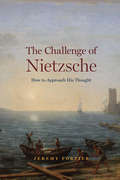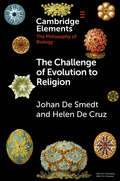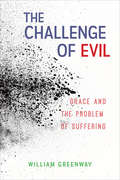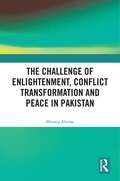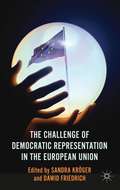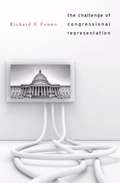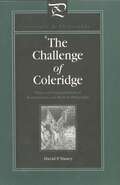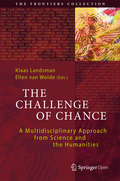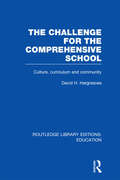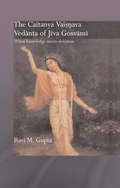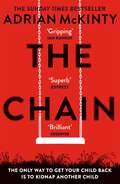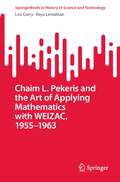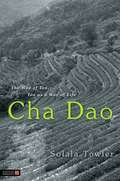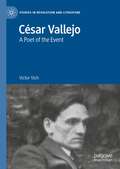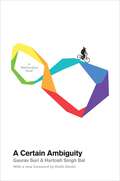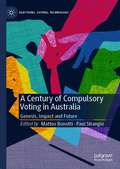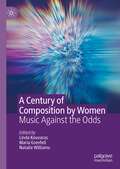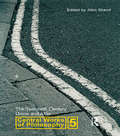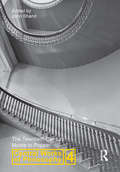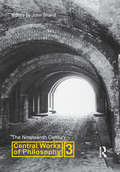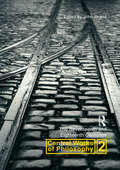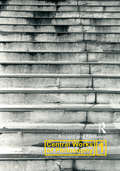- Table View
- List View
The Challenge of Nietzsche: How to Approach His Thought
by Jeremy FortierFriedrich Nietzsche is one of the most widely read authors in the world, from the time of his death to the present—as well as one of the most controversial. He has been celebrated as a theorist of individual creativity and self-care but also condemned as an advocate of antimodern politics and hierarchical communalism. Rather than treating these approaches as mutually exclusive, Jeremy Fortier contends that we ought instead to understand Nietzsche’s complex legacy as the consequence of a self-conscious and artful tension woven into the fabric of his books. The Challenge of Nietzsche uses Nietzsche as a guide to Nietzsche, highlighting the fact that Nietzsche equipped his writings with retrospective self-commentaries and an autobiographical apparatus that clarify how he understood his development as an author, thinker, and human being. Fortier shows that Nietzsche used his writings to establish two major character types, the Free Spirit and Zarathustra, who represent two different approaches to the conduct and understanding of life: one that strives to be as independent and critical of the world as possible, and one that engages with, cares for, and aims to change the world. Nietzsche developed these characters at different moments of his life, in order to confront from contrasting perspectives such elemental experiences as the drive to independence, the feeling of love, and the assessment of one’s overall health or well-being. Understanding the tension between the Free Spirit and Zarathustra takes readers to the heart of what Nietzsche identified as the tensions central to his life, and to all human life.
The Challenge of Evolution to Religion (Elements in the Philosophy of Biology)
by Johan De Smedt Helen De CruzThis Element focuses on three challenges of evolution to religion: teleology, human origins, and the evolution of religion itself. First, religious worldviews tend to presuppose a teleological understanding of the origins of living things, but scientists mostly understand evolution as non-teleological. Second, religious and scientific accounts of human origins do not align in a straightforward sense. Third, evolutionary explanations of religion, including religious beliefs and practices, may cast doubt on their justification. We show how these tensions arise and offer potential responses for religion. Individual religions can meet these challenges, if some of their metaphysical assumptions are adapted or abandoned.
The Challenge of Evil: Grace And The Problem Of Suffering
by William GreenwayBelief in God in the face of suffering is one of the most intractable problems of Christian theology. Many respond to the spiritual challenge of evil by ignoring it, blaming God, or insisting on the inherent meaninglessness of life. In this book, William Greenway contends that we don't have to deny our moral selves by either ignoring evil or abandoning our moral sensibilities toward it. We can open our eyes fully to suffering and evil, and our own complicity in them. We can do so because it is only in this full acceptance of the world's guilt and our own that we make ourselves fully open to agape, to being seized by love of others and God. Inspired by the Jewish philosopher Emmanuel Levinas and the Christian novelist Fyodor Dostoyevsky, The Challenge of Evil lovingly explains how we can look squarely at the overwhelming suffering in the world and still, by grace, have faith in a good and loving God.
The Challenge of Enlightenment, Conflict Transformation and Peace in Pakistan
by Moonis AhmarThis book looks at the process of cultural enlightenment in the context of Pakistan. It undertakes an interesting and in-depth research focusing on how the world’s second largest Muslim state can learn from Europe’s heritage of enlightenment. It studies why Pakistan lacks a process of awakening and what the scope of cultural enlightenment in Pakistan is against the backdrop of militant Islam. The author argues that cultural enlightenment can help promote positive conflict transformation in Pakistan and discusses the ways in which challenges to establishing a culture of reasoning, tolerance, accommodation, social justice and peace can be dealt with. A unique contribution, this book will be of interest to students and researchers of philosophy, political science, history, international relations, South Asian studies and religious studies. It will also appeal to think tanks, policymakers and general readers interested in these topics.
The Challenge of Democratic Representation in the European Union
by Sandra Kröger Dawid FriedrichWhat does political representation in the European Union look like? This volume argues that the transformation of representation in the EU is characterized by diversification processes, albeit with an uncertain ability to re-configure the link between representation and democracy.
The Challenge of Congressional Representation
by Richard F. FennoAt a moment when Congress is viewed by a skeptical public as hyper-partisan and dysfunctional, Richard Fenno provides a variegated picture of American representational politics. The Challenge of Congressional Representation offers an up-close-and-personal look at the complex relationship between members of Congress and their constituents back home.
The Challenge of Coleridge: Ethics and Interpretation in Romanticism and Modern Philosophy (Literature and Philosophy)
by David HaneyInterweaving past and present texts, The Challenge of Coleridge engages the British Romantic poet, critic, and philosopher Samuel Taylor Coleridge in a "conversation" (in Hans-Georg Gadamer’s sense) with philosophical thinkers today who share his interest in the relationship of interpretation to ethics and whose ideas can be both illuminated and challenged by Coleridge’s insights into and struggles with this relationship.In his philosophy, poetry, theology, and personal life, Coleridge revealed his concern with this issue, as it manifests itself in the relation between technical and ethical discourse, between fact and value, between self and other, and in the ethical function of aesthetic experience and the role of love in interpretation and ethical action.Relying on Gadamer’s hermeneutics to supply a framework for his approach, Haney connects Coleridge’s ideas with, among others, Emmanuel Levinas’s other-oriented notion of ethical subjectivity, Paul Ricoeur’s view about the other’s implication in the self, reinterpretations of Greek drama by Bernard Williams and Martha Nussbaum, and Gianni Vattimo's post-Nietzschean hermeneutics.Coleridge is treated not as a product of Romantic ideology to be deconstructed from a modern perspective, but as a writer who offers a "challenge" to our modern tendency to compartmentalize interpretive issues as a concern for literary theorists and ethical issues as a concern for philosophers. Looking at the two together, Haney shows through his reading of Coleridge, can enrich our understanding of both.
The Challenge of Chance: A Multidisciplinary Approach from Science and the Humanities (The Frontiers Collection)
by Ellen Wolde Klaas LandsmanThis book presents a multidisciplinary perspective on chance, with contributions from distinguished researchers in the areas of biology, cognitive neuroscience, economics, genetics, general history, law, linguistics, logic, mathematical physics, statistics, theology and philosophy. The individual chapters are bound together by a general introduction followed by an opening chapter that surveys 2500 years of linguistic, philosophical, and scientific reflections on chance, coincidence, fortune, randomness, luck and related concepts. A main conclusion that can be drawn is that, even after all this time, we still cannot be sure whether chance is a truly fundamental and irreducible phenomenon, in that certain events are simply uncaused and could have been otherwise, or whether it is always simply a reflection of our ignorance. Other challenges that emerge from this book include a better understanding of the contextuality and perspectival character of chance (including its scale-dependence), and the curious fact that, throughout history (including contemporary science), chance has been used both as an explanation and as a hallmark of the absence of explanation. As such, this book challenges the reader to think about chance in a new way and to come to grips with this endlessly fascinating phenomenon.
The Challenge For the Comprehensive School: Culture, Curriculum and Community (Routledge Library Editions: Education)
by David HargreavesBy 1982 the ambitious claims made for newly established comprehensive schools were being put to the test. How effectively does the comprehensive meet the needs of all young people? Do urban, working-class students enjoy more success than in the secondary modern schools? Are they more engaged in their learning with higher self-esteem? This volume discusses these questions and examines issues of social mobility and cohesion, curriculum, the balance between academic and vocational education, the place of exams in the educational system and the influence of independent schools. The author asks whether a more decentralised system of self-governing schools improve the education service – a timely question which along with the other issues examined is as relevant and challenging today as when the book was originally published in 1982.
Chalk Lines: The Politics of Work in the Managed University
by Randy MartinThe increasing corporatization of education has served to expose the university as a business--and one with a highly stratified division of labor. In Chalk Lines editor Randy Martin presents twelve essays that confront current challenges facing the academic workforce in U.S. colleges and universities and demonstrate how, like chalk lines, divisions between employees may be creatively redrawn. While tracing the socioeconomic conditions that have led to the present labor situation on campuses, the contributors consider such topics as the political implications of managerialism and the conceptual status of academic labor.They examine the trend toward restructuring and downsizing, the particular plight of the adjunct professor, the growing emphasis on vocational training in the classroom, and union organizing among university faculty, staff, and graduate students. Placing such issues within the context of the history of labor movements as well as governmental initiatives to train a workforce capable of competing in the global economy, Chalk Lines explores how universities have attempted to remake themselves in the image of the corporate sector. Originally published as an issue of Social Text, this expanded volume, which includes four new essays, offers a broad view of academic labor in the United States. With its important, timely contribution to debates concerning the future of higher education, Chalk Lines will interest a wide array of academics, administrators, policymakers, and others invested in the state--and fate--of academia.Contributors. Stanley Aronowitz, Jan Currie, Zelda F. Gamson, Emily Hacker, Stefano Harney, Randy Martin, Bart Meyers, David Montgomery, Frederick Moten, Christopher Newfield, Gary Rhoades, Sheila Slaughter, Jeremy Smith, Vincent Tirelli, William Vaughn, Lesley Vidovich, Ira Yankwitt
The Chaitanya Vaishnava Vedanta of Jiva Gosvami: When Knowledge Meets Devotion (Routledge Hindu Studies Series)
by Ravi M. GuptaThe Chaitanya Vaishnava tradition is famous for its depth of devotion to Krishna, the blue-hued Deity. Chaitanya Vaishnavas are known for having refined the practice and aesthetics of devotion into a sophisticated science. This imposing devotional edifice was constructed upon a solid foundation of philosophical argument and understanding. In this book, Ravi Gupta sheds new light on the contribution of Chaitanya Vaishnavism to the realm of Indian philosophy. He explores the hermeneutical tools employed, the historical resources harnessed, the structure of the arguments made, and the relative success of the endeavor. For most schools of Vaishnavism, the supporting foundation consists of the philosophical resources provided by Vedanta. The Chaitanya tradition is remarkable in its ability to engage in Vedantic discourse and at the same time practice an ecstatic form of devotion to Krishna. The prime architect of this balance was the scholar-devotee Jiva Gosvami (ca. 1517 - 1608). This book analyses Jiva Gosvami's writing concerning the philosophy of the Vedanta tradition. It concludes that Jiva's writing crosses 'disciplinary boundaries', for he brought into dialogue four powerful streams of classical Hinduism: the various systems of Vedanta, the ecstatic bhakti movements, the Puranic commentarial tradition, and the aesthetic rasa theory of Sanskrit poetics. With training in and commitments to all of these traditions, Jiva Gosvami produced a distinctly Chaitanya Vaishnava system of theology.
The Chain: The Award-Winning Suspense Thriller of the Year
by Adrian McKintyTHE ONLY WAY TO GET YOUR CHILD BACK IS TO KIDNAP ANOTHER CHILD'A blazing, full-tilt thriller that entirely justifies the hype' GUARDIAN'A heart-stopping roller coaster' DAILY MAIL* * * * *YOUR PHONE RINGS.A STRANGER HAS KIDNAPPED YOUR CHILD.TO FREE THEM YOU MUST ABDUCT SOMEONE ELSE'S CHILD.YOUR CHILD WILL BE RELEASED WHEN YOUR VICTIM'S PARENTS KIDNAP ANOTHER CHILD.IF ANY OF THESE THINGS DON'T HAPPEN:YOUR CHILD WILL BE KILLED.VICTIM. SURVIVOR. ABDUCTOR. CRIMINAL.YOU WILL BECOME EACH ONE. YOU ARE NOW PART OF THE CHAIN * * * * *THE MULTI-AWARD-WINNING THRILLERWinner: Theakstons Old Peculier Crime Novel of the YearWinner: Ned Kelly Award for Best International Crime Fiction Winner: International Thriller Writers Awards - Best Hardcover Winner: Macavity Awards - Best International Crime Fiction Winner: Barry Award - Thriller of the Year*****'A heart-stopping roller coaster'DAILY MAIL'The book everyone is talking about'MIRROR'Scary, plausible, gripping.'IAN RANKIN'You'll miss meals, sleep, and your stop on the bus - guaranteed.'VAL McDERMID'I writhed with the pain of withdrawal when I finished it. Deserves to be the popular hit of the year.'DAILY TELEGRAPH'Incredibly propulsive and original. You won't shake it for a long time.'STEPHEN KING'A masterpiece. You will never be able to forget it.'DON WINSLOW'A unique and unforgettable thriller. Breath-taking, breakneck, brilliant.'MARK BILLINGHAM'Striking, memorable, should be savoured.'TANA FRENCH'Explosively brilliant. Genuinely unputdownable. Terribly plausible'OBSERVER'I may not read a better thriller in my lifetime.'STEVE CAVANAGH 'An electrifying thriller - one of the very best of its kind'FIONA CUMMINS'What a fantastic idea and perfectly written. I'm quite jealous.'ANTHONY HOROWITZ'Terrifying. Terrific.'MICK HERRON'THE CHAIN does for parenting what Gone Girl did for marriage. A must-read thriller.'JAMES SWALLOW'Diabolical, unnerving, relentless.'DENNIS LEHANE'Utterly brilliant'ELLY GRIFFITHSA 'THRILLER OF THE YEAR' SELECTION FOR:GUARDIANDAILY TELEGRAPHAMAZONEXPRESSOBSERVERTIME MAGAZINE
Chaim L. Pekeris and the Art of Applying Mathematics with WEIZAC, 1955–1963 (SpringerBriefs in History of Science and Technology)
by Leo Corry Raya LeviathanThis book describes the groundbreaking work of Chaim Leib Pekeris and his collaborators. Between 1955 and 1963 they used the first electronic computer built in Israel, the Weizmann Automatic Computer (WEIZAC), to develop powerful numerical methods that helped achieve new and accurate solutions of the Boltzmann equation, calculate energy levels of the helium atom, produce detailed geophysical and seismological models derived from the study of the free oscillations of the earth, and refine models used to predict meteorological phenomena and global oceanic tides. This book provides a unique account of the pioneering work of Chaim L. Pekeris in applied mathematics and explains in detail the background to the rise of the Weizmann Institute as a world-class center of scientific excellence. This hitherto untold story is of great interest to historians of twentieth-century science with special emphasis on the application of computer-assisted numerical methods in various branches of mathematical physics.
Cha Dao: The Way of Tea, Tea as a Way of Life
by Solala TowlerIn China, the art and practice of drinking tea is about much more than merely soaking leaves in a cup of hot water. The tradition is rooted in Daoism, and emerged from a philosophy that honoured living a life of grace and gratitude, balance and harmony, and fulfilment and enjoyment - what the ancient Chinese called Cha Dao, or the Way of Tea. Cha Dao takes us on a fascinating journey through the Way of Tea, from its origins in the sacred mountains and temples of ancient China, through its links to Daoist concepts such as Wu Wei or non-striving and the Value of Worthlessness, to the affinity between Tea Mind and the Japanese spirit of Zen. Interspersed are a liberal helping of quotes from the great tea masters of the past, anecdotes from the author's own trips to China, and traditional tea stories from China and Japan. The unique health benefits of tea are also explored, and a chapter is devoted to describing the history, characteristics and properties of 25 different tea varieties. This book will interest tea lovers, as well as those who want to learn more about tea culture, Daoist and Zen thought and practice, and Asian history and culture.
César Vallejo: A Poet of the Event (Studies in Revolution and Literature)
by Víctor VichThis book argues that the poetry of César Vallejo announces the event, as a moment of irruption of a truth that destabilises the usual state of reality. It studies the emergence of a subject who affirms a truth that exceeds the law, interrupts hegemonic repetition, asserts universal solidarity, and defends "lost causes" despite political failure. The author reconfigures the traditional reading of Vallejo only as a poet of pain and human suffering, and offers new ways of understanding the relationship between poetry and politics.
Cervantes, Literature and the Discourse of Politics
by Anthony J. CascardiWhat is the role of literature in the formation of the state? Anthony J. Cascardi takes up this fundamental question in Cervantes, Literature, and the Discourse of Politics, a comprehensive analysis of the presence of politics in Don Quixote. Cascardi argues that when public speech is constrained, as it was in seventeenth-century Spain, politics must be addressed through indirect forms including comedy, myth, and travellers' tales.Cervantes, Literature, and the Discourse of Politics convincingly re-engages the ancient roots of political theory in modern literature by situating Cervantes within a long line of political thinkers. Cascardi notably connects Cervantes's political theory to Plato's, much as the writer's literary criticism has been firmly linked to Aristotle's. He also shows how Cervantes's view of literature provided a compelling alternative to the modern, scientific politics of Machiavelli and Hobbes, highlighting the potential interplay of literature and politics in an ideal state.
A Certain Ambiguity: A Mathematical Novel
by Gaurav Suri Hartosh Singh BalWhile taking a class on infinity at Stanford in the late 1980s, Ravi Kapoor discovers that he is confronting the same mathematical and philosophical dilemmas that his mathematician grandfather had faced many decades earlier--and that had landed him in jail. Charged under an obscure blasphemy law in a small New Jersey town in 1919, Vijay Sahni is challenged by a skeptical judge to defend his belief that the certainty of mathematics can be extended to all human knowledge--including religion. Together, the two men discover the power--and the fallibility--of what has long been considered the pinnacle of human certainty, Euclidean geometry. As grandfather and grandson struggle with the question of whether there can ever be absolute certainty in mathematics or life, they are forced to reconsider their fundamental beliefs and choices. Their stories hinge on their explorations of parallel developments in the study of geometry and infinity--and the mathematics throughout is as rigorous and fascinating as the narrative and characters are compelling and complex. Moving and enlightening, A Certain Ambiguity is a story about what it means to face the extent--and the limits--of human knowledge.
A Century of Compulsory Voting in Australia: Genesis, Impact and Future (Elections, Voting, Technology)
by Matteo Bonotti Paul StrangioCompulsory voting has operated in Australia for a century, and remains the best known and arguably the most successful example of the practice globally. By probing that experience from several disciplinary perspectives, this book offers a fresh, up-to-date insight into the development and distinctive functioning of compulsory voting in Australia. By juxtaposing the Australian experience with that of other representative democracies in Europe and North America, the volume also offers a much needed comparative dimension to compulsory voting in Australia. A unifying theme running through this study is the relationship between compulsory voting and democratic well-being. Can we learn anything from Australia’s experience of the practice that is instructive for the development of institutional bulwarks in an era when democratic politics is under pressure globally? Or is Australia’s case sui generis – best understood in the final analysis as an intriguing outlier?
A Century of Composition by Women: Music Against the Odds
by Linda Kouvaras Maria Grenfell Natalie WilliamsThis book presents accounts of creative processes and contextual issues of current-day and early-twentieth century women composers. This collection of essays balances narratives of struggle, artistic prowess, and of "breaking through" the obstacles in the profession. Part I: Creative Work – Then and Now illuminates historical and present-day women’s composition and various iterations and conceptions of the “feminine voice”; Part II: The State of the Industry in the Present Day provides solutions from the frontline to sector inequities; and Part III: Creating; Collaborating: Composer and Performer Reflections offers personal stories of current creation in music. A Century of Composition by Women: Music Against the Odds draws together topical issues in feminist musicology over the past century. This volume provides insight into the professional and compositional procedures of creative women in music and stands to be relevant for composers, performers, industry professionals, students, and feminist and musicological scholars for many years to come.
Central Works of Philosophy v5: Twentieth Century: Quine and After (Central Works Of Philosophy Ser. #Vol. 5)
by John ShandCentral Works of Philosophy is a major multi-volume collection of essays on the core texts of the Western philosophical tradition. From Plato's Republic to the present day, the five volumes range over 2,500 years of philosophical writing covering the best, most representative, and most influential work of some of our greatest philosophers. Each essay has been specially commissioned and provides an overview of the work, clear and authoritative exposition of its central ideas, and an assessment of the work's importance. Together these books provide an unrivaled companion for studying and reading philosophy, one that introduces the reader to the masterpieces of the western philosophical canon. This volume covers the central texts in the history of analytic philosophy from Quine's Word and Object (1960) to the present day. The texts range over political philosophy, ethics, metaphysics and the philosophies of language, mind and logic and represent some of the most important philosophical work of the last forty years. Students and non-specialists who may find the technicality of some of the texts forbidding will welcome the clarity of exposition and exegesis that the essays provide. Taken together the essays provide both a map and compass for the current philosophical landscape and will prove a valuable resource not only for undergraduate and postgraduate philosophy students but for teachers and researchers in allied disciplines who need an understanding of the preoccupations of contemporary philosophy.
Central Works of Philosophy v4: Twentieth Century: Moore to Popper
by John Shand"Central Works of Philosophy" is a major multi-volume collection of essays on the core texts of the Western philosophical tradition. From Plato's "Republic" to the present day, the five volumes range over 2,500 years of philosophical writing covering the best, most representative, and most influential work of some of our greatest philosophers. Each essay has been specially commissioned and provides an overview of the work, clear and authoritative exposition of its central ideas, and an assessment of the work's importance. Together these books provide an unrivaled companion for studying and reading philosophy, one that introduces the reader to the masterpieces of the western philosophical canon. The period, 1900-60, which this volume covers, witnessed changes in logical and linguistic analysis far beyond anything dreamt of in the previous history of the subject. The volume begins with chapters on the key texts of the Cambridge philosophers, Moore, Russell and Wittgenstein, which together marked the emergence of analytical philosophy. The Vienna Circle of the 1920s, and the development of logical positivism in the 1930s and 1940s are represented by chapters on two fundamental works by Carnap and Ayer. William James' "Pragmatism," which formulated pragmatism's epistemology and made it known throughout the world represents in the volume the distinctive ideas of the American pragmatists. Essays on Husserl's "The Idea of Phenomenology," Heidegger's "Being and Time," Sartre's "Being and Nothingness" and Merleau-Ponty's "Phenomenology of Perception" cover the core texts of the hugely significant phenomenological movement. Of the linguistic philosophy that dominated the English-speaking world in the immediate postwar years, Wittgenstein's "Philosophical Investigations" and Ryle's "The Concept of the Mind" are discussed in turn. The volume concludes with Karl Popper's influential account of the nature of science. Volume 4 covers the key works of philosophy written in the period 1900-60, which witnessed developments in logical and linguistic analysis far beyond anything dreamt of in the previous history of the subject. The volume includes chapters on central works by the Cambridge philosophers Moore, Russell and Wittgenstein, which together contributed to the emergence of analytic philosophy. The ideas of the Vienna Circle of the 1920s, and the logical positivism of the 1930s and 1940s are explored in chapters dealing with the works of Carnap and Ayer, and the distinctive ideas of the American pragmatists are discussed in a chapter on William James' Pragmatism, which propagated pragmatism by presenting its central tenets in a clear and accessible form. Essays on Husserl's "The Idea of Phenomenology," Heidegger's "Being and Time," Sartre's "Being and Nothingness" and Merleau-Ponty's "Phenomenology of Perception" cover the core texts of the continental European traditions of phenomenology and existentialism. Of the linguistic philosophy that dominated the English-speaking world in the immediate postwar years, Wittgenstein's "Philosophical Investigations" and Ryle's "The Concept of Mind" are discussed in turn. The volume concludes with a chapter on Karl Popper's influential account of the nature of scientific method in his seminal work, "The Logic of Scientific Discovery."
Central Works of Philosophy v3: Nineteenth Century (Central Works Of Philosophy Ser. #5)
by John ShandCentral Works of Philosophy is a major multi-volume collection of essays on the core texts of the Western philosophical tradition. From Plato's Republic to the present day, the five volumes range over 2,500 years of philosophical writing covering the best, most representative, and most influential work of some of our greatest philosophers. Each essay has been specially commissioned and provides an overview of the work, clear and authoritative exposition of its central ideas, and an assessment of the work's importance. Together these books provide an unrivaled companion for studying and reading philosophy, one that introduces the reader to the masterpieces of the western philosophical canon. Much of nineteenth-century philosophy may be viewed as either an affirmation or rejection of Kant. This volume therefore begins with Kant's magnum opus, the Critique of Pure Reason. Michelle Grier provides a masterly distillation of this monumental work. Curtis Bowman explores the central text of the first of the great post-Kantian idealists, Fichte who extended Kantian philosophy in a new direction. Hegel, one of Kant's most formidable critics, is given incisive treatment by Michael Inwood in his presentation of the Phenomenology of Spirit. Schopenhauer's World as Will and Representation, which hoped to solve many of the problems that Kant's philosophy left unsolved is explored in Dale Jacquette's chapter. The moral philosophy of John Stuart Mill, perhaps the only philosopher in this volume to circumvent Kant's influence, is examined in Jonathan Riley's essay on his classic work On Liberty. The philosophical ideas of Kierkegaard, widely credited as the founder of modern existentialism, are explored by Stephen Evans in his essay on Philosophical Fragments. Marx's Capital, one of the most influential books of the modern age, is given expert treatment by Tom Rockmore. The volume closes with Nietzsche, whose appropriation of Kant led to a radical anti-philosophy. Rex Welshon dissects his most philosophical and widely read work, On the Genealogy of Morals.
Central Works of Philosophy v2: Seventeenth and Eighteenth Centuries (Central Works Of Philosophy Ser. #5)
by John ShandCentral Works of Philosophy is a major multi-volume collection of essays on the core texts of the Western philosophical tradition. From Plato's Republic to Quine's Word and Object, the five volumes range over 2,500 years of philosophical writing covering the best, most representative, and most influential work of some of our greatest philosophers, each of them primary texts studied at undergraduate level. Each essay has been specially commissioned and provides an overview of the work, clear and authoritative exposition of its central ideas, and an assessment of the work's importance then and now. Each essay equips the reader with the resources and confidence to go on to read the works themselves. Together these books provide an unrivaled companion for studying and reading philosophy, one that introduces the reader to the masterpleces of the western philosophical canon and some of the greatest minds that have ever lived talking about the profoundest most exciting problems there are. The seventeenth and eighteenth centuries saw a brilliant outpouring of philosophical thought unprecedented in human history. Together philosophy and science pushed medieval and Renaissance scholasticism aside to lay the foundations of the modern world. Beginning with Descartes' Meditations, the contributors examine some of the period's most seminal philosophical texts: Spinoza's Ethics, which presents a complete picture of reality that has at its heart how we can be good, the Monadology, in which Leibniz describes what must underpin reality if it is to be fully explained, Hobbes' Leviathan, which reminds us of the dangers of the unchecked brutality of humanity; Rousseau's Social Contract, a vision of how human nature can be changed for the better in a new society, Locke's Essay Concerning Human Understanding which wishes us to grasp that we must make knowledge our own through experience not authority, Berkeley's attack on materialism in his Treatise and Hume's search for rational justification for our most basic beliefs about the world in his Treatise of Human Nature. Together these essays offer students a remarkable survey of the key texts and core ideas that make up the age of rationalism and empiricism.
Central Works of Philosophy v1: Ancient and Medieval (Central Works Of Philosophy Ser. #5)
by John ShandThis collection of essays showcases the most important and influential philosophical works of the ancient and medieval period, roughly from 600 BC to AD 1600. Each chapter takes a particular work of philosophy and discusses its proponent, its content and central arguments. These are: Plato's Republic; Aristotle' Nichomachean Ethics; Lucretius' On the Nature of the Universe; Sextus Emperiicus' Outlines of Pyrrhonism; Plotinus' The Enneads; Augustine's City of God; Anselm's Proslogion; Aquinas' Summa Theologia; Duns Scotus' Ordinatio; William of Ockham's Summa Logicae .
Central Bank Independence and Transparency: Evolution and Effectiveness
by Christopher Crowe Ellen E. MeadeA report from the International Monetary Fund.
